Dar el Bacha Confluences Museum in Marrakech | New Palace
…. Dar el Bacha Confluences Museum in Marrakech Palace Pacha Glaoui, located in the medina of Marrakech, is one of the most beautiful palaces of the red city. Also called “the governor’s palace”, or Dar el Glaoui, it was built at the beginning of the 20th century.
1/ Dar El Bacha Palace… a bit of history
Dar el Bacha Confluences Museum in Marrakech was the residence of Thami El Glaoui, named Pasha of Marrakech by a Dahir (decree) of Sultan Moulay Youssef in 1912. Thami el Glaoui, nicknamed the “lord of the Atlas”, was one of the most famous Pasha of Morocco. He assisted Marshal Lyautey in the pacification of Morocco on behalf of the French Protectorate.
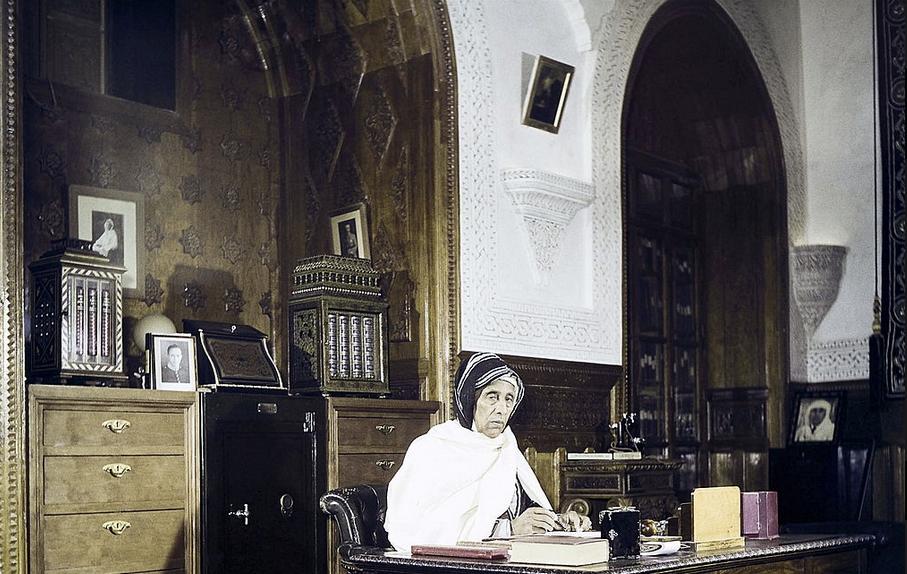
Dar el Bacha Musee des Confluences Palais Pacha Glaoui Marrakech | glaoui – bureau marrakech dar el bacha
The Dar el Bacha Confluences Museum in Marrakech was then known for the sumptuous lifestyle of the Pasha and its magnificent celebrations and receptions, with the presence of the greats of this world, including Winston Churchill and Jacques Majorelle, friend of Thami el Glaoui.
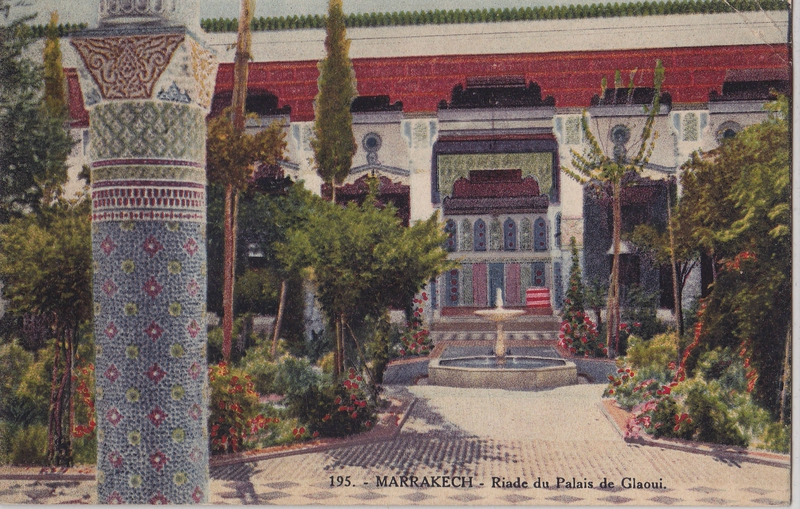
Dar el Bacha Musee des Confluences Palais Pacha Glaoui Marrakech | riad palais du glaoui
“Dar el Bacha Confluences Museum in Marrakech Palace Pacha Glaoui Marrakech” embodies a complex period for the unity of the Kingdom of Morocco during the period of the French protectorate. In December 1950, Thami El Glaoui asked the new Sultan Sidi Mohammed, the son of Sultan Moulay Youssef, not to “follow” the Istiqlal Party, which favoured Morocco’s independence from France and Spain. Following a petition from Tham el Glaou and 23 other pachas and 323 Caïds, the new Sultan of Morocco, better known a few years later as Mohammed V, was sent into exile in Corsica and then to Madagascar.
Thami el Glaoui, when Mohammed V returned from exile in 1955, had to submit and died of cancer in his Kasbah in Telouet in 1956.
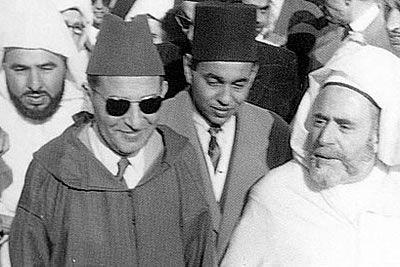
Dar el Bacha Musee des Confluences Palais Pacha Glaoui Marrakech | Sa Majesté le Sultan Sidi Mohammed Ben Youssef lors du retour d’exil
Discover the Full Article about Madrassa Ben Youssef, Millenary Monument
2/ Opening at the end of 2017 of the Confluences Museum
A palace such as Dar el Bacha Confluences Museum in Marrakech Palace Pacha Glaoui Marrakech, with its luxurious decorations, elaborate pediments, painted walls, cedar wood panelling, cedarwood coffered ceilings, geometric and floral motifs, and Andalusian Arab-style zelliges, has everything to house a great 21st century museum and be accessible to the public.
After several years of work, the premises were rehabilitated and the museum offer put in place. His Majesty King Mohamed VI visited the renovation and conversion site in January 2017. This new museum space was partially opened on December 18, 2017. Mehdi Qotbi, president of the Museums Foundation, oversees the site.
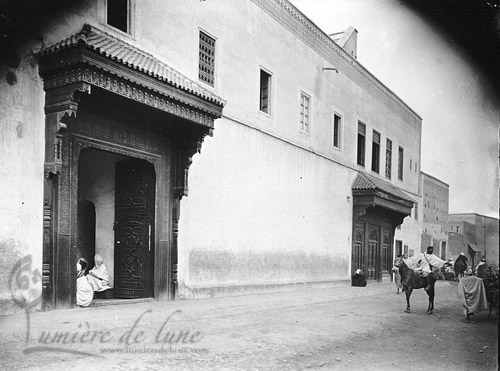
dar el bacha musee confluences marrakech lieux saints |Dar-el-Glaoui-Marrakech
This project will have an exhibition space dedicated to the art of Islam. Writings, tablets and various objects related to the science and knowledge of Islamic culture will be on display.
A space reserved for the international collection of Patty Cadby Birch, representing the four continents (America, Africa, Europe, and Asia) is also planned. Patty Birch was an archaeologist but above all a lover of the city of Marrakech. Philanthropist and refined, it arrived in the 80’s, when the Jet Set was magnetized by Marrakech’s Exotic Romanticism. She bequeathed her personal collection to the Kingdom of Morocco. More than 3000 antique objects, archaeological treasures as well as jewelers and weapons dating from the Maya, Cretan and Chinese civilizations make up this collection. The works of art span from 5000 BC to the present day.
Finally, a space dedicated to temporary exhibitions will be accessible.
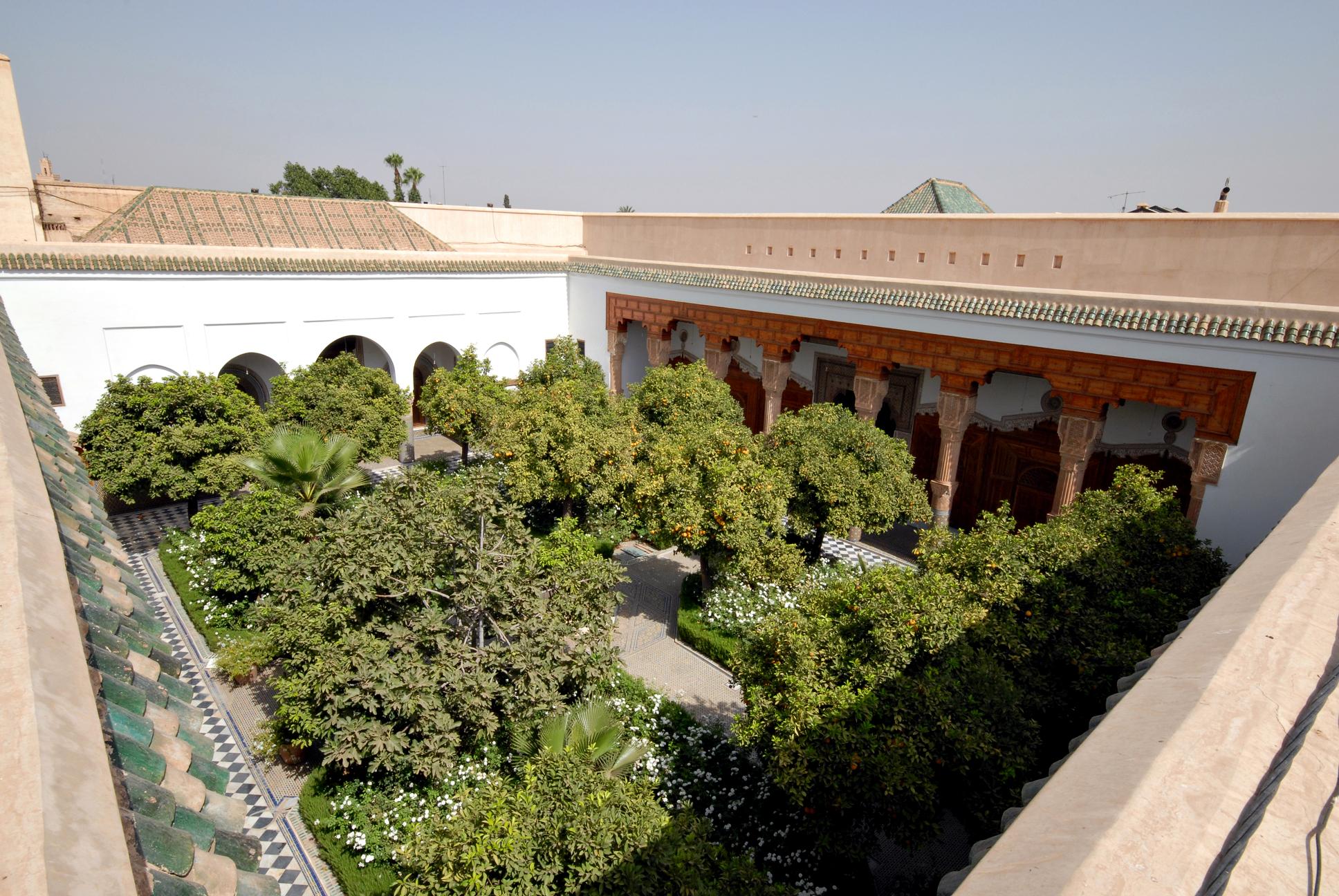
Dar el Bacha Musee des Confluences Palais Pacha Glaoui Marrakech
Discover the Full Article about El Badi Palace, Saadian Masterpiece
3/ FNM & MUCEM
Since 2014, it is the National Foundation of Museums (FNM) of Morocco, which is in charge of the renovation of the Dar el Bacha Museum of Confluences Palace Pacha Glaoui Marrakech in Marrakech.
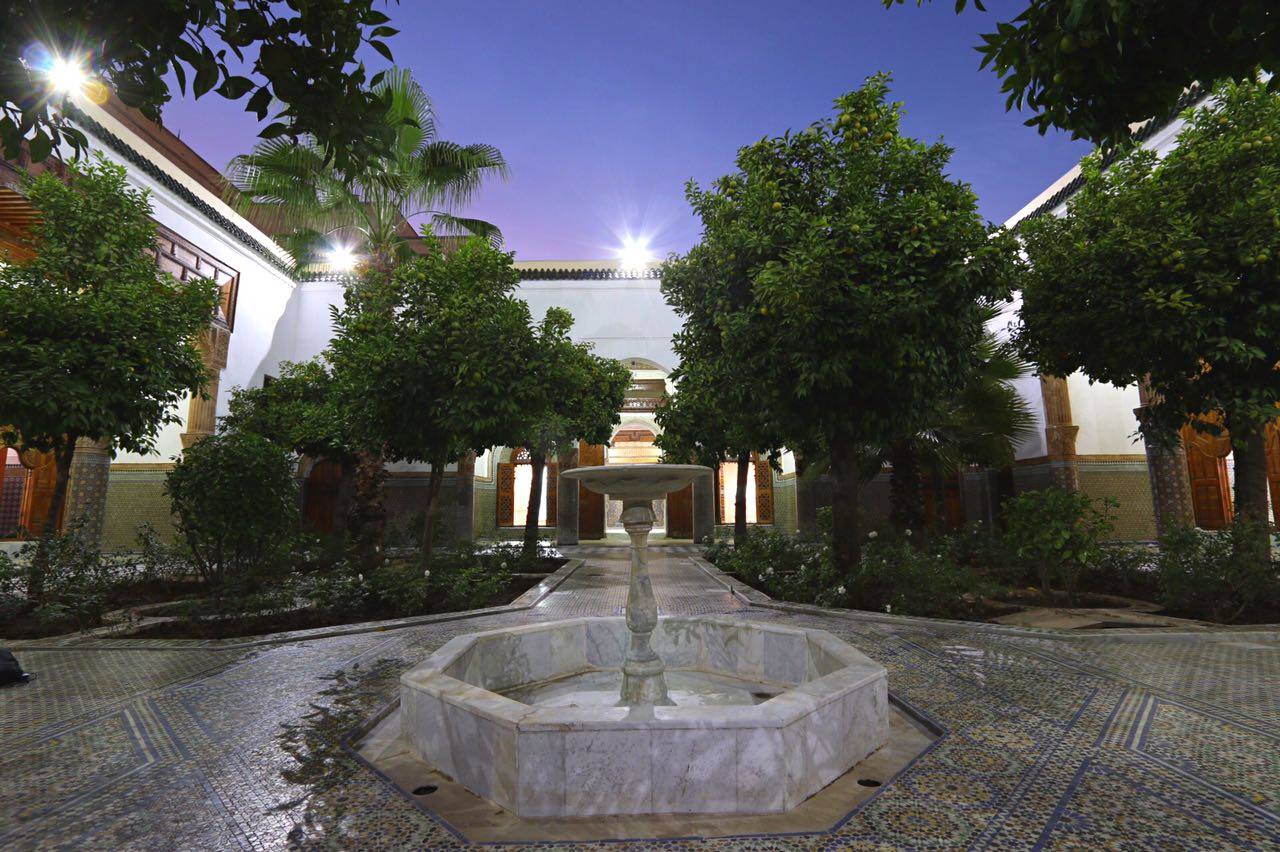
Dar el Bacha Confluences Museum in Marrakech
Renamed Dar El Bacha – Museum of Confluences, it is the 2nd museum in Marrakech managed by the FNM. The first Artistic Place under the control of the FNM in Marrakech being the Dar Si Said Museum, in Medina. Through Morocco, the FNM manages more than a dozen other museums, such as the Museum of Safi Ceramics, the Archaeological Museum of Tetouan, the Mohamed VI Museum of Modern and Contemporary Art in Rabat-Salé, the Al Batha Museum in Fez and the Kasbah Museum of Mediterranean Cultures in Tangier, to name but a few.
Created in 2013, the Mucem, the Museum of Civilizations of Europe and the Mediterranean, which is located in Marseille, France, works in collaboration with the FNM. Since their very creation, Mucem and FNM have been closely linked by an agreement between the two institutions with a view to setting up exchanges of expertise in terms of scientific research and training. The Mucem aims to collect and present to the public cultural property representative of the arts and civilizations of Europe and the Mediterranean. For example, the exhibition “Splendeurs de Volubilis, bronzes Antiques du Maroc et de la Méditerranée”, which was created in Marseille in 2014, exhibited masterpieces from the collection of the Archaeological Museum of Rabat.
Discover the Full Article about the Koutoubia Mosque, dating 1120
4 / Shared Holy Places. At the crossroads of the three monotheistic religions | The 1st Temporary Exhibition
In January 2017, the FNM (National Foundation of Museums) and the Mucem (Museum of Civilizations of Europe and the Mediterranean in Marseille) signed a partnership agreement for the presentation of the exhibition “Lieux Saints partagees” at the Cat Dar El Bacha in Marrakech in autumn 2017.
“Shared Holy Places “is the very first temporary exhibition open to the public since the reopening of Dar el Bacha Museum of Confluences Palace Pacha Glaoui Marrakech. It should be noted that the rehabilitation of this palace in Marrakech includes the creation of several spaces dedicated to the art of Islam, Moroccan culture and temporary exhibitions.
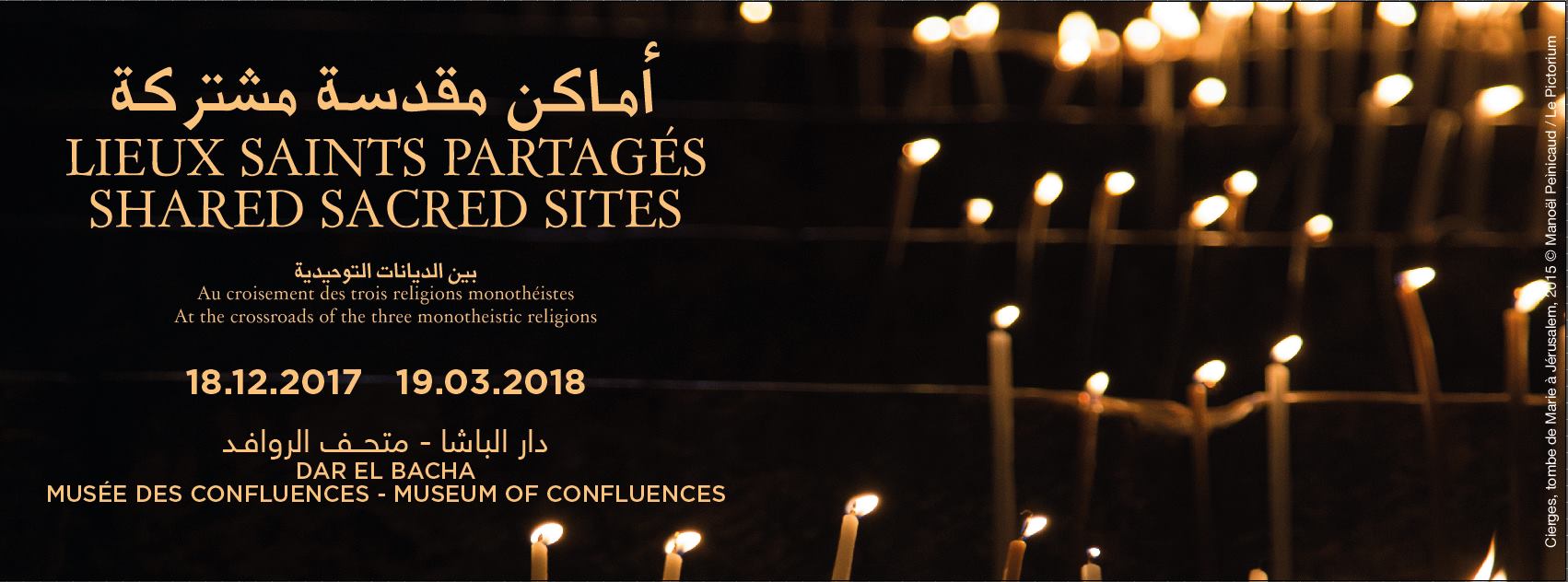
dar el bacha musee confluences marrakech lieux saints
This exhibition takes a different look at the religious practices of the Mediterranean peoples and highlights the interaction and exchange between the three monotheistic religions, yesterday and today, which is one of the most interesting phenomena in the region,”states the FNM in its press release. The exhibition is designed as a journey through the heart of a multicultural Mediterranean by showing figures, places and practices. The will is to make visitors observe “these little-known phenomena which concern millions of people around the Mediterranean”, continues FNM President Mehdi Qotbi. The exhibition shows the commonalities between Christian, Jewish and Muslim religions. It provides historical evidence of the common past, of exchanges, tolerance and union between the three religions. Often opposed in the Mediterranean news, the three monotheistic religions resemble each other much more than one might think.
The exhibition “Sharing Holy Places” was first presented at the Mucem in Marseille, from April to August 2015. It went then to the National Museum of Bardo in Tunis, from 19 November 2016 until 13 February 2017. From 18 December 2017 to 19 March 2018, the exhibition can be seen at the Dar El Bacha Bacha Museum of Confluences in Marrakech.
For Morocco, the exhibition has been adapted with emphasis on the shared sacred places of the Kingdom. Visitors will also be able to take an interest in the anthropological aspect of certain monuments and sacred places and see works of art and objects from Moroccan collections as well as Mucem.
“Sharing Holy Places” is a highly symbolic exhibition dedicated to the 3 religions: Other culture, the culture of the other. A beautiful response to current identity, communitarian or extremist impulses. Cohabitation, exchange and dialogue remain notions constantly carried by His Majesty the King of Morocco Mohamed 6. December 18 to March 19, 2018
USEFULL INFORMATIONS
Dar el Bacha Museum of Confluences Palace Pacha Glaoui Marrakech
Address: Dar El Bacha Street – Medina of Marrakech
Opening hours: every day except Tuesday from 9am to 4pm.
Admission fees: 30dhs for nationals, 60 dhs for foreigners and free for children and students
Friday: free for nationals and foreign residents in Morocco
You might also be interested in:
©alksar 2019 – https://www.alksar.com

